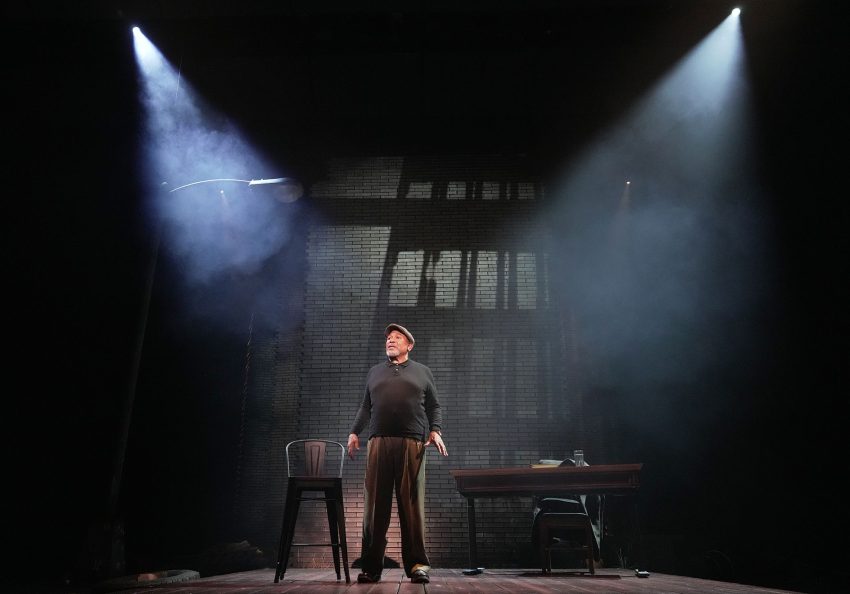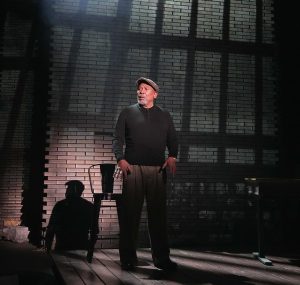
“How I Learned What I Learned” Reveals Black Writer’s Struggle—at TheatreWorks
August Wilson Slaps Us in the Face Till We Laugh!
by Phyllis Chrisman
Steven Anthony Jones single-handedly wrings our hearts and makes our sides ache from laughing. In August Wilson’s memoir, he reveals what it means to be a Black artist in America.
Wearing baggy chinos and a black shirt with the words: “I Am Supposed To Be White,” Jones limps into the spotlight and struggles up the stairs to a stage with a single chair and a backdrop resembling a wall of books. The perspiration has already beaded on his brow, as he booms forth in a raspy voice.
He paces, wipes his brow, sits, rises, then suddenly bursts into ragged song, and dances a brief jig. All the while, he mesmerizes us with the heart-breaking, humorous story of life in Pittsburgh’s African American Hill District.

When Wilson moved into the Hill District in 1957, he called it “an amalgam of the unwanted, melting into the pot!” He is blessed by a wise Mama who teaches: “Something is not always better than nothing.” When Mama goes to collect the new washing machine she won in a radio contest, the organizers took note of her race and gave her a coupon for a used machine at the local Goodwill.
Mama, head high, walked away, and for two years saved every nickel until the proud day she brought home her very own brand spanking new washing machine. “Something is not always better than nothing!”
In 1965, Wilson leaves home to fend for himself in the Hill District, which he describes as a Third World country. Luckily, he discovers 85 Crawford Street, just a few blocks away from home . . . and the rent is only $25 every two weeks!

In his search for a job, we meet the toy store owner who assumes Wilson will steal even before he has been hired. When he applies to mow lawns, his boss withers when the homeowner orders, “Get that man off my property!”
We meet good friend Cy Morocco, who carries a magazine, asking people about the articles. We soon realize that the subterfuge hides his inability to read.
We ache when Wilson finds out what happens when he cannot pay his rent on time. because was in jail. Eviction is unmerciful.

Wilson extracts a heavy tome from the wall of books, opening to the word “Black.” The definition, which appears magically, confirms that the word has been memorialized in a plethora of pejorative terms, including “Satan,” to stigmatize all Black people.
The audience gasps gently as Jones stumbles . . . is this Wilson portrayed by Jones? Or Jones himself—wilting, exhausted from his brilliant, emotional performance? As the soliloquy draws to a thought-provoking close, the audience rises as one in a standing ovation.
In the 60s, the oldest people in Wilson’s opening-night, full house audience were youngsters. Today, Jones transmits Wilson’s sorry truth with a forgiving hand.
Wilson’s honest, hurtful, humorous, and heinous struggle is the common story that resonates with every Black artist, musician, author, entrepreneur, man, woman, and child. When will that story change?
“How I Learned What I Learned” by August Wilson, co-conceived by Todd Kreidler, directed by Tim Bond, scenic design by Nina Ball, The Oregon Shakespeare Festival Production, at TheatreWorks, Silicon Valley, Mountain View, California. Info: TheatreWorks.org – to February 3, 2024.
Cast: Steven Anthony Jones (August Wilson)
Banner photo: Steven Anthony Jones (as August Wilson). Photos: Jenny Graham